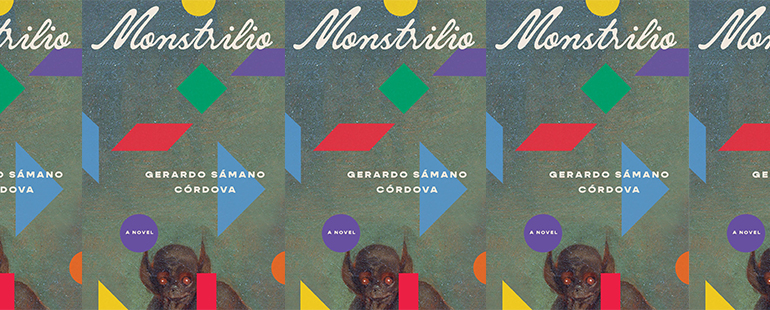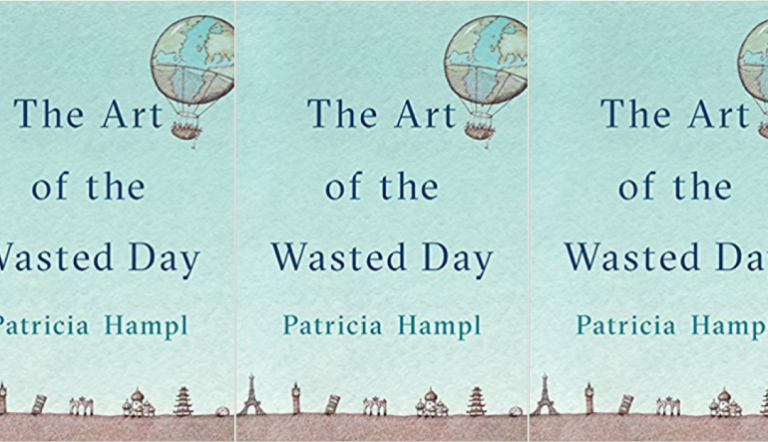Endless Grief in Gerardo Sámano Córdova’s Monstrilio

Monstrilio
Gerardo Sámano Córdova
Zando | March 7, 2023
In Gerardo Sámano Córdova’s debut novel Monstrilio, a grotesque grief comes to life. Magos, a grieving mother, cuts the single lung from her late son’s corpse, and feeds it. The lung grows into a creature not unlike a Miyazaki dust sprite—only it has an arm-tail and fangs. It’s charming in the way a piranha is: best looked at through the glass. The more it feeds, the more it grows into a shadow of Magos’s dead son. Before long she can’t help calling it his name: Santiago.
Sámano Córdova’s work is as devastating as its premise is whimsical. The author wastes no time on the good times—Santiago dies in the opening sentence. The grief, like its arm-tailed avatar, is all consuming. The novel’s first quarter is sequestered in Magos’s obsessive perspective. She cannot cry, and cannot let go of the lung she carved from her child’s chest. Though she knows feeding it will grow a monster, she cannot stop herself. The fable-like elements of the story follow a grief-logic without losing touch with reality. Magos’s magical thinking is obviously doomed, not by our shared understanding of death as the final doorway, but by our shared understanding of that most impossible grief-stage: bargaining. Wouldn’t you feed the pain?
Sámano Córdova moves into three other points of view: Magos’s best friend, Lena, Santiago’s father, Joseph, and the titular Monstrilio. This allows the novel room to breathe and play. Long in love with Magos, Lena’s perspective offers a crucial witness to that maternal grief. This book is not about the loss of a child alone—it chronicles how grief makes aliens of our loved ones.
Magos abandons her husband to his mourning, and returns home to Mexico City, where Lena has been waiting since childhood. She is the first confidant when it comes to the little monster growing under Magos’s bed. Lena cannot believe what her friend has done, becoming an accomplice because she cannot carry Magos’s grief for her. There is a temporary relief to exiting Magos’s POV—the reader is not so close to the wound, and can see from the outside just how far Magos is gone. Lena is not necessarily a more reliable narrator, but her slight remove keeps things from staring directly into oblivion for too long. Her undying and unrequited love for Magos lends the story another layer. She tries to shunt aside her pain in favor of Magos’s, to a similar dead-end.
Sámano Córdova’s tale transcends simple allegory by committing fully to the reality of a lung come to life. There is a major time jump at the halfway point, where Monstrilio matures into the basically human M. While cinematic representations of personified grief like The Babadook end before the outside world can really enter the mix, Monstrilio strides confidently into literalism. Compare it to Max Porter’s Grief is The Thing with Feathers, wherein a massive crow haunts a grieving widower. The crow is illegible to most everyone else, whereas Monstrilio is a painfully public problem. He eats the neighbor’s cat, he bites his boyfriend until he draws blood. This is another strength of Córdova’s construction; while grief feels incredibly isolating, its tendrils stretch far beyond the singular sufferer.
When it’s Joseph’s turn to narrate, Sámano Córdova shows off yet another fragile facet of loss: healing. Newly engaged to his fiancé Peter, and years removed from Santiago’s traumatic death, Joseph comfortably loves his not-son Monstrilio. Things are going pretty well. He has tended to the monster, nurtured it, taught it how to hide its fangs. Yet he knows as well as the audience that the price has yet to be paid. Even as one learns to live with it, the threat that pain will bite again—harder, next time—never goes away. The looming relapse feels truest in this novel rife with hard truths about loss. Sámano Córdova asks readers to imagine cheating death even for a little bit, even if we know it will all go wrong, even if we know the second grief can only be worse.
Before its promised cathartic and bloody end, the novel pauses on an exchange between Lena and Joseph. He teases her for so long following Magos’s beck and call. The two cannot address the monster in the room. Lena brushes Joseph off, saying, “Even I am capable of getting over things.” That is the fantasy Monstrilio so succinctly spurns. What’s more unbelievable? A lung that grows into a boy or a grief that has an end?


